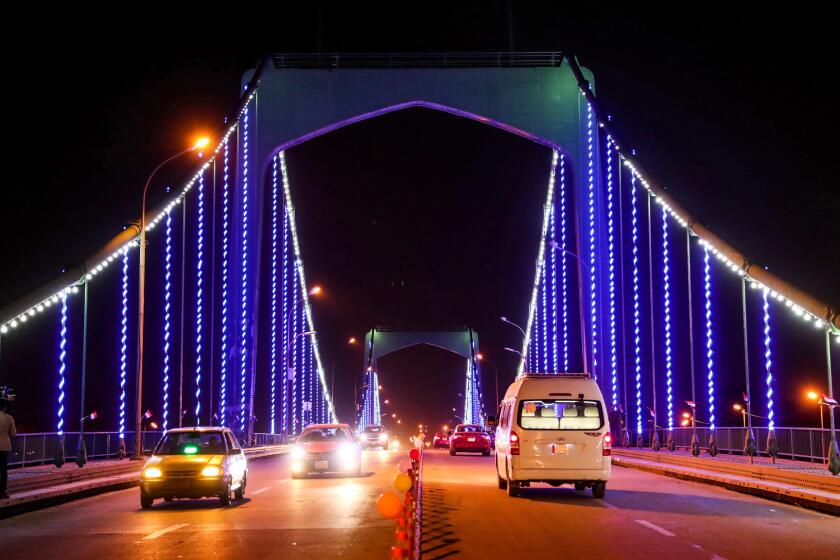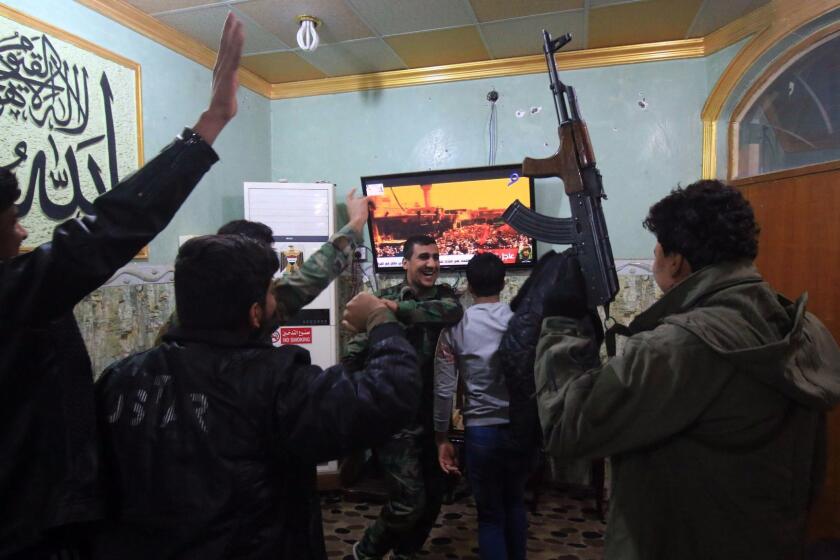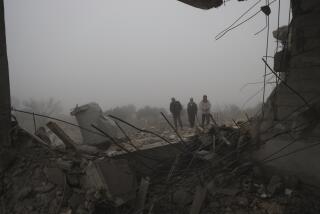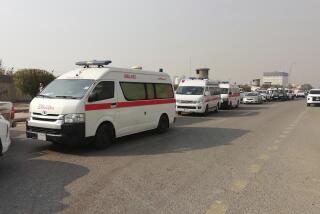At urging of ayatollah, Iraq’s prime minister agrees to resign
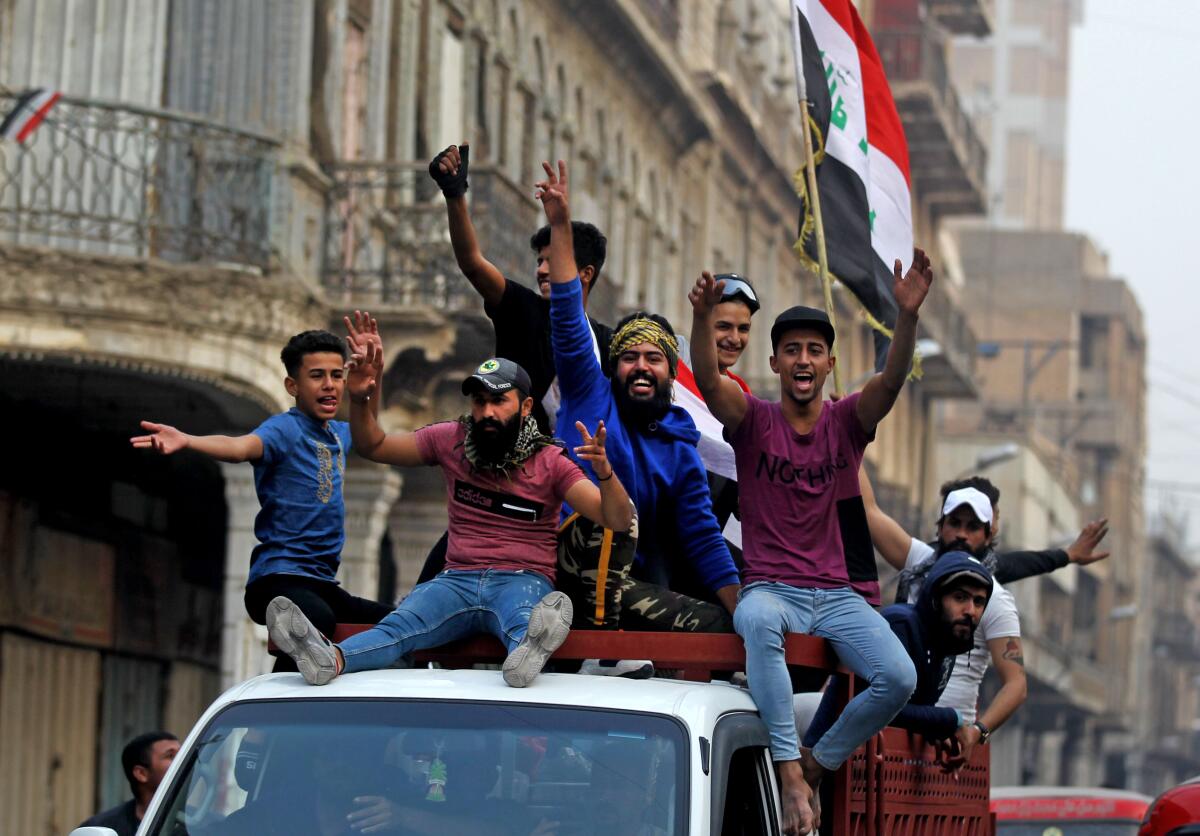
In Iraq’s bloody path to democracy following the U.S.-led invasion in 2003, Grand Ayatollah Ali Sistani, the leading authority for Shiite Muslims worldwide, held an unparalleled position of moral authority but rarely intervened in matters of governing.
On Friday, in the wake of weeks of protests that have left more than 400 people dead, Sistani broke his customary silence and called on parliament to select a new leader. Hours later, Prime Minister Adel Abdul Mahdi acquiesced to Sistani’s counsel and announced he would present his resignation to parliament.
Moments after Abdul Mahdi issued his statement, celebrations broke out in Baghdad, the Iraqi capital, with protesters in Tahrir Square cheering to cries of “Long live Iraq; long live the revolution” while others shot off fireworks.
Despite the jubilation, few believe the premier’s departure will mollify protesters’ anger. Since Oct. 1, demonstrations have bloomed in Baghdad and across the country’s south against what many say is corruption and grotesque ineptitude on the part of the ruling elite.
Protesters, most of them young and from the country’s Shiite majority, have braved bullets, tear gas canisters, internet shutdowns and curfews. They have demanded a full dismantling of the political class that emerged in the wake of the U.S. invasion and which they blame for dismal living conditions despite Iraq’s oil wealth.
This week, Iraqi security services shot 40 protesters to death in a 24-hour period ending Thursday evening.
In his statement, Abdul Mahdi said he had listened with “great concern” to Sistani’s call and would heed it by submitting an official request to leave his position as the head of the current government.
It came in the aftermath of what was considered to be one of the bloodiest days since the anti-government protests began, with scores of mostly unarmed protesters cut down in the southern Iraqi city of Nasiriyah by “rapid response” units, an elite force that has received U.S. training and support. Human rights watchdog Amnesty International condemned the violence there, saying it was a “bloodbath” that had the city looking like a “war zone.”
It was that fighting that pushed Sistani — a figure who in the past had been derisively called the “silent authority” for his reticence in commenting on political matters — to speak out and call for parliament to change leaders. In a sermon delivered during Friday prayers, Sistani called on parliament to “reconsider its options” in the wake of the government’s “clear inability” to deal with the unrest.
Iraqi political leaders, including Muqtada Sadr, the populist cleric who has styled himself as a supporter of the demonstrators’ call for reform, moved to capitalize on Abdul Mahdi’s statement. On Friday, Sadr released a statement saying the resignation was the “first fruits of the revolution” and called for a new government to be formed.
The carnage continued Friday in Nasiriyah, prompting U.N. Secretary-General António Guterres to issue a statement saying he was “deeply concerned over reports of the continued use of live ammunition against demonstrators in Iraq.”
He called on authorities “to exercise maximum restraint, protect the lives of demonstrators, respect the rights to freedom of expression and assembly, and swiftly to investigate all acts of violence.”
On Friday, a State Department spokesman said the U.S. shared “the protesters’ legitimate concerns.”
“We continue to urge the government of Iraq to advance the reforms demanded by the people, including those that address unemployment, corruption, and electoral reform,” the spokesman said.
Abdul Mahdi had previously offered to leave his post Oct. 31 if parliament could find another successor. Parliament refused.
His resignation request Friday does not mean he has left his post; he remains the head of a fully operational government until parliament ratifies a majority vote of no confidence. If it passes, he would remain as caretaker.
It would then fall on parliament, a deeply fractured body that is hostage to the country’s sectarian divide, to choose his replacement from the largest bloc. Yet members of parliament have tussled for months about which bloc that would be; Abdul Mahdi, lackluster but independent, was chosen as a compromise candidate after months of paralysis because he was acceptable to the top groups.
Even if parliament could overcome its fractiousness to actually select a replacement, it’s unlikely to be enough. Like the demonstrations in Algeria and Sudan this year, and the wide protest parades in Lebanon that began last month and toppled the government there, those on the streets are seeking the uprooting of a political order they accuse of siphoning off their country’s resources while beggaring much of the population.
The contrast is especially galling in Iraq. Though the country is awash with 148.8 billion barrels of proven oil reserves, amounting to 9% of the world’s oil supply, it doesn’t even have 24-hour electricity, and a full quarter of the country’s youth are unemployed, according to the World Bank.
Besides, few see parliament as representative; some 40% of the population was reported to have voted in parliamentary elections held last year, the lowest turnout since 2003 but a figure that many nevertheless believe is inflated. (The elections were plagued by accusations of fraud as well as malfunctioning voting machines.)
Many of those politicians are also seen as beholden to external powers, including the U.S. and especially Iran, Iraq’s onetime enemy (the two countries engaged in an almost eight-year war during the rule of Iraqi strongman Saddam Hussein). Iran has since integrated itself into the top echelons of power in Baghdad.
Sistani also called on parliament to speed up preparations for “free and fair elections whose results truly express the will of the Iraqi people.”
Meanwhile, many fear the escalating violence would plunge the country into renewed fighting even as it had just begun to recover from years of combating Islamic State.
Iraq’s prime minister declared victory Saturday over Islamic State, the extremist group that imposed its brutal reign on millions, saying government forces have driven the militants from their last footholds in the country after three years of grueling combat.
During the Sunni jihadist group’s blitzkrieg toward Baghdad in 2014, it was Sistani who issued the call to arms that mobilized hundreds of thousands of mostly Shiite youth overnight to fight the extremists and repel their assault. On Friday, he warned of a new danger to Iraq, one that could lead, he said, to a “cyclone of violence” that would reverse what little progress the country had made.
“The enemies and their pawns are planning … to spread chaos and destruction and drag the country towards infighting and then restore the era of reviled dictatorship,” Sistani said, adding that protesters should make sure there were no “saboteurs” within their ranks.
“All must cooperate to not make them miss the opportunity to do so.”
More to Read
Start your day right
Sign up for Essential California for news, features and recommendations from the L.A. Times and beyond in your inbox six days a week.
You may occasionally receive promotional content from the Los Angeles Times.
